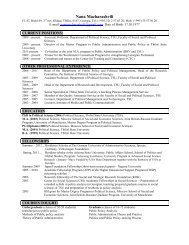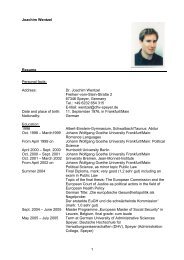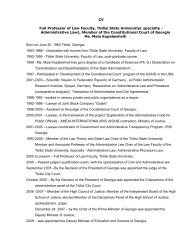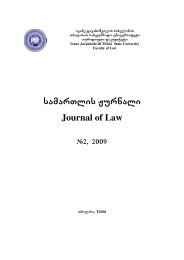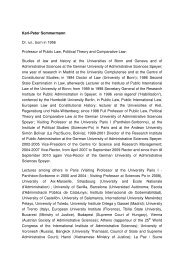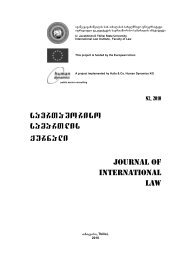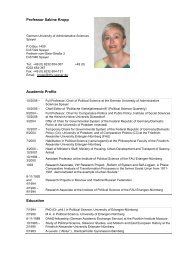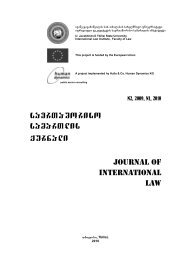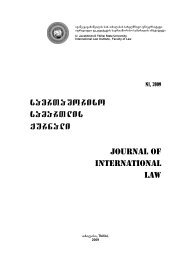Untitled
Untitled
Untitled
Create successful ePaper yourself
Turn your PDF publications into a flip-book with our unique Google optimized e-Paper software.
saerTaSoriso samarTlis Jurnali, #1, 2008 JOURNAL OF INTERNATIONAL LAW, N1, 2008<br />
As the Essay will demonstrate, idea of inviolability<br />
of state sovereignty is no longer that<br />
integral, when protection of human beings from<br />
mass violations of human rights is at stake.<br />
Development of human rights law, introduction<br />
of an idea of humanitarian intervention<br />
and no plea of immunities whatsoever before<br />
international tribunals signals this. Concern<br />
must be expressed in relation to domestic tribunals<br />
that are not entitled to fully exercise<br />
universal jurisdiction and the concept of judging<br />
criminal leaders is basically confined to<br />
judicial institutions created under international<br />
authority 31 . Writing in 1994 Sir Watts noted,<br />
that “it is […] to be cautious about the extent<br />
to which a restrictive rule of State immunity is<br />
sufficiently generally supported throughout<br />
the international community to be yet established<br />
as a rule of customary international law:<br />
the trend towards adoption of the restrictive<br />
view is strong, but it cannot yet be said to enjoy<br />
consensus. 32<br />
Advancement of human rights law in 20 th<br />
century determined support of human rights<br />
more than inviolability of certain highest level<br />
state officials, representing a state and thus<br />
covered by different immunities. This transformation<br />
was accompanied with the march of<br />
development of human rights notion since the<br />
World War II: human rights are no longer “domestic<br />
matter of a state.” 33<br />
Therefore, it follows that despite huge importance<br />
attaching to the protection of sovereign<br />
equality of states, protection of human beings<br />
from atrocities must be valued more and<br />
political consideration shall be determined and<br />
to certain extent substituted by considerations<br />
of necessity of protection of humans from the<br />
evil emanating in many cases from own government.<br />
Meanwhile, concept of humanitarian intervention<br />
seems to have emerged and even<br />
secured support of a number of respected international<br />
law scholars 34 , not to mention the<br />
support of states which recognize this concept<br />
as lawful. Now developments also move towards<br />
recognizing “outlaw” states 35 . Observing<br />
these novelties, it can be argued that protection<br />
of immunities can not stay unconditionally<br />
intact. If the international community can<br />
decide to “outlaw” the states leaders of which<br />
perpetrate international crimes, an argument<br />
follows that domestic courts of the same states<br />
may be permitted to exercise universal jurisdiction<br />
to prosecute the perpetrators, disregarding<br />
the different immunities they may have<br />
the benefit of.<br />
The subsequent chapters of the Essay will<br />
focus on correlation of notion of immunities<br />
and individual criminal responsibility for international<br />
crimes on the one hand and relatively<br />
newly emerged concepts of humanitarian<br />
intervention on the other. However, it is important<br />
to mention them at this stage as well, to<br />
demonstrate that the old notion of state sovereignty<br />
has lost its original importance not<br />
only in relation to separate individuals (despite<br />
their rank), but in relation to entire countries,<br />
in a sense of entire territories within a given<br />
state boundaries. Comparison of these notions<br />
will once again demonstrate that concept<br />
of immunities may not be appealed to so courageously<br />
any more, as these newly materialized<br />
notions incur and imply responsibility of<br />
not only individual criminal leaders of any given<br />
sovereign state, but “punishment” of entire<br />
state. Consequently, it may be concluded<br />
without restraint that even if immunities and<br />
protection of sovereign equality of states did<br />
matter more than protection of human beings<br />
from massive atrocities, this does not hold true<br />
any more.<br />
III. HOW DOES THE NOTION OF INDIVIDUAL<br />
CRIMINAL RESPONSIBILITY FOR GRAVE<br />
INTERNATIONAL CRIMES CORRELATE<br />
WITH IMMUNITIES<br />
A problem related to prosecuting criminal<br />
leaders protected by immunities and involved<br />
in perpetration of international crimes emerges<br />
as a rule when exercise of universal criminal<br />
jurisdiction by domestic courts of states is<br />
considered. Surfacing question in this regard<br />
is as follows: Can it be claimed that international<br />
law has always straightforwardly supported<br />
absolute immunity and inviolability of<br />
the highest ranking “well-protected” 36 To analyze<br />
this, an overview of recognition of individual<br />
criminal responsibility for international<br />
crimes is apt: examining advancement of the<br />
concept of individual criminal responsibility of<br />
high ranking state officials gives a possibility<br />
to glance over the progress in developing the<br />
notion of charging and judging the criminal<br />
leaders for international crimes, irrespective<br />
of their immunities and privileges. These transformations<br />
served as considerable challenge<br />
to the idea of state immunity in respect of in-<br />
68



